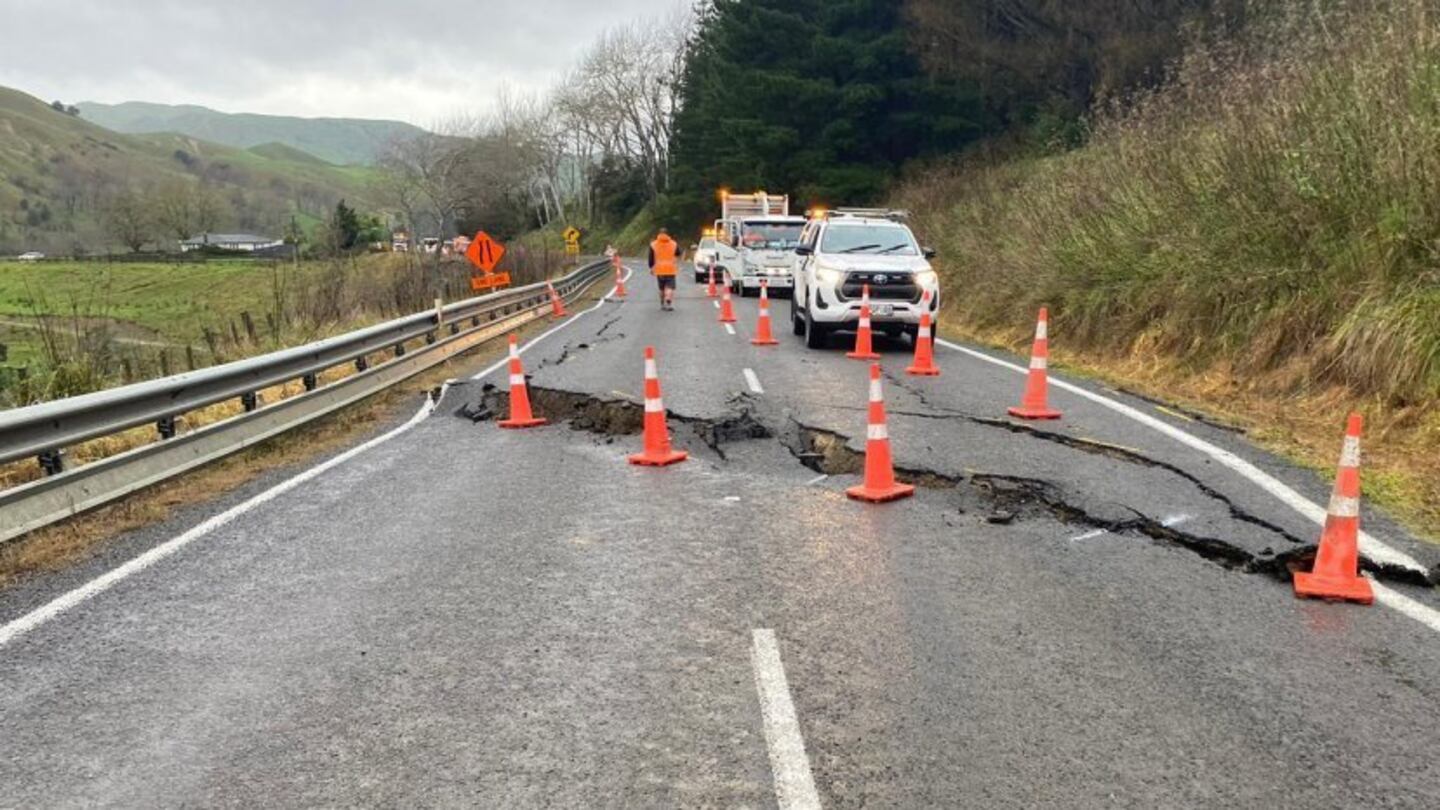Last month's storms caused a lot of damage on State Highway 2 on Ōtōko Hill, northwest of Gisborne. photo/Te Tai Rāwhiti Civil Defence
Te Aitanga a Mahaki lead negotiator Willie Te Aho has condemned what he calls an "arrogant approach" by Waka Kotahi-NZTA and its major contractors within the eastern tribe's rohe.
Te Aho, who also represents Te Whānau a Apanui, said he had reiterated to NZTA that the Transport Agency model of procurement in Te Whànau a Apanui and Te Aitanga a Mahaki was flawed.
"Ko te mana motuhake te kaupapa matua. Ko enei huarahi ka haere i waenganui i te pū manawa o a mātou iwi, engari kei waho mātou e titiro ana ki ngā whakaritenga, ki ngā rautaki."
(Our right to self-determination is key here. These roads that need to be repaired run right through our iwi but we are left outside looking in.)
His comments come as Cyclone Recovery Minister, Grant Robertson visited Gisborne to sign the East Coast Recovery Alliance deal that will see Waka Kotahi and KiwiRail work with contracting organisations Fulton Hogan, Downer and Higgins to manage, design and do physical works in the rebuild of state highways and the rail network across Te Tai Rāwhiti and Hawke's Bay.
Te Aho says building an enduring road network "must be a part of our economic recovery that we lead," and believes a major disruption is needed for iwi to be included in all levels of solution making, "not just on the lollipop signs but real decision making."
Parata's new road example
"Kua kitea ngā hua o te mahi o Te Rangimatanuku Parata i te wā i tau mai a Huripari Gabrielle i roto i a Tokomaru Ākau i a Uawa. Nānā tonu i hanga i te huarahi hou kia tarea e ngā whānau o Tokomaru te haere mai ki Tūranga nei ki tiki kai, i ngā taputapu, ngā penehini.
(We saw what Te Rangimatanuku Parata and his team did when Gabrielle smashed Tokomaru Bay and Uawa. They built a brand new road themselves to allow those whānau to get to Gisborne and buy food, equipment and petrol.)
"Kua tauiratia. Mā mātou, mā ngā iwi e whakahaere i ngā kaupapa e pā ana kia mātou."
(So it's been shown that iwi can and should lead programmes that are directly relevant to us.)
While many of the workers who will be working on the rebuilds will be locals with whakapapa to the whenua they're working on, Te Aho says that isn't good enough.
"Ko te mate kē ko ngā rangatira o ngā kamupene rā, he Pākehā. Mā te Pākehā e whakatau i ngā kaupapa i runga, i roto i ngā rohe Māori. Kore rawa mātou e whakaae ki tērā. Mā mātou e whakahaere i ngā kaupapa i roto i a mātou ake.
(The problem is that those companies are run by Pākehā. Pākehā will be the ones making decisions on and in regions that are Māori. We will never agree to that. We should run our own kaupapa.)
"Kāore mātou e tuku atu ki tētahi atu ki te whakahaere i a mātou. Ki te pērā, karekau he mana, karekau he mana motuhake o mātou te hau kainga."
(We will never give up our rights to make decisions about us to others. If we did that, we would just be giving away our mana at home.)
Te Aho met Robertson today to discuss his concerns. He says the minister appreciated the iwi position.
"Hei tāna mā te hau kainga e mahi tahi ki ngā kamupene o te kaunihera ki te whakarauora i ngā whānau, i ngā hapori i roto i Te Tai Rāwhiti. Whakaae ana mātou ki tērā, engari ko te mate kē, mō tēnei kaupapa ko te whakatau a NZTA, mā ngā kamupene Pākehā mātou e whakahaere."
(Robertson said local iwi should be working with councils and their contractors to help whānau and communities across the East Coast. We agree completely, but the problem is in this instance NZTA has decided to contract big Pākehā-owned companies to work in our rohe.)
Teaomaori.news has approached Waka Kotahi for comment. No comment has been received so far.




